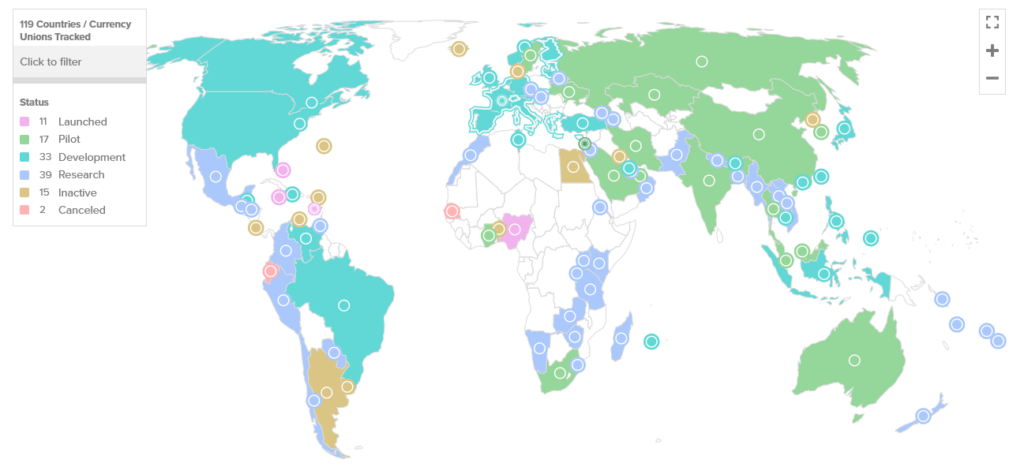Central Financial institution Digital Currencies (CBDCs) are much like decentralized cryptocurrencies equivalent to Bitcoin, besides they centralize energy and affect to a single entity – whose targets might not match yours or mine.
Latest months have seen an acceleration in CBDC growth. Along side quite a few political blunders coming to gentle, together with the mishandling of the well being disaster, a hostile narrative towards them has emerged.
Whereas CBDC advocates tout advantages equivalent to higher monetary inclusion and larger effectivity, considerations about their potential risk to private sovereignty aren’t going away.
A world community of CBDCs is on the way in which.
Based on the Atlantic Council, nearly all of international locations have both launched or are within the strategy of launching a Central Financial institution Digital Forex (CBDC), with African international locations standing out because the outliers on this case.

Proponents argue that minimizing the price of currencies, making cross-border transactions faster and safer, and tackling the problem of foreign money counterfeiting are legitimate causes to implement CBDCs.
Financial institution of Worldwide Settlements (BIS) Common Supervisor Agustin Carsten echoed this sentiment final yr, saying CDBCs can probably result in world monetary stability whereas minimizing related danger.
Moreover, Carsten eerily implied solely central banks have the precise to supervise cash programs, not “large tech” or personal cryptocurrencies.
“the soul of cash belongs neither to an enormous tech nor to an nameless ledger.”
In current weeks, all G7 countries have moved into the event stage of their respective CBDC applications. Mexico revised its rollout date to someday in 2024, and the digital rouble is working a check pilot – signaling sturdy momentum towards a world CBDC community.
The issue with CBDCs
Talking on Fox Information just lately, funding banker and former U.S. authorities official Catherine Fitts detailed a scathing account of CBDCs, calling their implementation “the final shutting of the gate.”
Fitts spoke of a normal ignorance towards the problem, particularly, what number of are sleepwalking right into a system the place our belongings develop into the central banks’ belongings – thus rendering residents extensions of the state.
“we don’t perceive that when this gate closes on us, we’ll actually be sitting in a system the place the central banks consider our belongings belong to them…”
Beneath a CBDC system, authorities can probably management a person’s spending. Examples embrace blocking particular purchases or retailers, limiting spending and switch quantities, and even imposing expiry dates on the cash. As such, CBDCs are usually not currencies; as a substitute, they’re a “monetary transaction management grid,” Fitts warned.
She concluded that we can’t let propaganda persuade us that CBDCs are handy or wanted.
The digital pound to restrict transfers
Though Fitts’ account was largely hypothetical, there are situations discovered elsewhere which might be factual, supporting her factors to a major diploma.
On Feb. 4, the Financial institution of England (BoE) and the U.Okay. Treasury launched their CBDC roadmap and introduced a four-month-long session to find public opinion on the digital pound.
Based on the Telegraph, the Treasury’s preliminary plans restrict customers’ transfers to a couple thousand kilos to forestall the potential of banking collapses ensuing from fast outflows. The Treasury said that switch limits encourage adoption whereas balancing implementation danger. Nonetheless, it added that “these limits could possibly be amended sooner or later.”
Whereas the Treasury might elevate switch limits sooner or later, the preliminary imposition of a restrict does little to encourage confidence amongst these sick of political shenanigans and doublespeak – extra so when commentators like Fitts emphasize the hyperlink between CBDCs and monetary tyranny.
The digital yuan pilot program marches on
The Individuals’s Financial institution of China (PBoC) initiated its digital yuan program in 2014. It has since undergone a number of phases of testing and growth. In November 2020, the primary public check pilot was launched in Shenzhen, adopted by an growth to 10 further cities in April 2022.
People take part in this system by making use of to enter a lottery by means of China’s 4 main banks. Randomly chosen winners obtain a portion of the allotted funds. Within the Shenzhen trial, 50,000 winners acquired digital “pink envelopes” value 200 yuan ($30) every. The recipients had been in a position to spend the cash at native retailers.
By September 2022, this system was prolonged to provinces, with testing in Guangdong, Hebei, Jiangsu, and Sichuan. Extra just lately, in March 2023, the Fujian province was included in this system.
Social credit score system
The CBDC monetary tyranny Fitts described is regarding sufficient by itself. Nonetheless, when mixed with a social credit score system, it turns into the stuff of dystopian nightmares.
China’s social credit score system was first introduced in 2014, coinciding with the launch of the digital yuan analysis group. The planning doc highlighted the significance of administering “complete credit score data” and selling social cohesion to foster larger belief inside society.
“is an efficient methodology to strengthen social sincerity, stimulate mutual belief in society, and decreasing social contradictions, and is an pressing requirement for strengthening and innovating social governance, and constructing a Socialist harmonious society.”
The system applies to people and companies and works like credit score scores within the West. Factors are added and deducted based mostly on needed and undesirable conduct – as decided by the state. So, for instance, the late cost of enterprise taxes would lead to a deduction.
For the reason that social credit score rating system remains to be within the pilot part, a low rating’s final penalties are unknown. Nonetheless, based mostly on experiences, punishments have included being blocked from touring on trains and planes, the kids of low-scoring dad and mom being stopped from attending sure universities, informing employers’ hiring choices, elevated chance of audits and inspections, and public shaming.
Studies additionally point out that there could also be regional variations within the scoring, with particular actions leading to a factors deduction in some cities however not others.
There isn’t a logical argument in opposition to deterring and punishing extreme crimes. However residents say trivial offenses are additionally punished, equivalent to jaywalking, strolling a canine and not using a leash, dishonest in a online game, and never visiting dad and mom usually sufficient – elevating severe questions on political overreach.
Alex Gladstein, the Chief Technique Officer on the Human Rights Basis, stated an built-in CBDC social credit score system units a daunting paradigm. Considerations are warranted, contemplating the Communist Celebration’s historical past of human rights abuses and lack of transparency.
“When the federal government can take monetary privileges away for posting the unsuitable phrase on social media, saying the unsuitable factor in a name to folks, or sending the unsuitable picture to family, people self‐censor and train excessive warning. On this approach, management over cash can create a social chilling impact.”
Skeptics would say social credit score programs would by no means see the sunshine of day elsewhere, particularly within the “democratic” West. But, in December 2022, the Italian authorities rolled out a digital ID program in Rome and Bologna to reward “Web Zero” practices. Some argue that digital IDs are a forerunner to a social credit score program.
Recreation over for freedom?
In current weeks, quite a few notable people have voiced unease over a coordinated assault on the crypto trade by way of the banking system, AKA “Operation Chokepoint 2.0,”
Though this system just isn’t immediately linked to the push in direction of CBDCs, former Coinbase CTO Balaji Srinivasan has little doubt the 2 are associated.
In a March tweet, Srinivasan stated the upcoming FedNow cost system is the precursor to the American CDBC system – warning that the unprepared shall be locked right into a digital monetary ringfence.
The newest developments noticed regulation agency Cooper and Kirk name on Congress to research the “backroom struggle on crypto.” They argued that current regulatory actions had been illegal and unconstitutional and intent on hindering the digital asset trade.
They advisable a number of steps to carry regulators accountable, together with reminding companies that they’re topic to the Administrative Process Act and should observe due course of and probing whether or not regulators deliberately suppressed personal sector innovation.
Preventing again
Chris Blec, decentralization advocate and CEO of the Blec Report, instructed CryptoSlate that CBDCs are offered on effectivity, comfort, and bettering society. However behind the hopeful message is an try “get rid of our monetary privateness and micro-manage our lives.”
Nonetheless, Blec stated the struggle just isn’t misplaced, and it’s as much as every of us to struggle again by:
- Backside-up motion – shopping for decentralized personal cryptocurrencies like Bitcoin.
- Prime-down motion – utilizing the political system to help anti-CBDC representatives.
“Backside-up is shopping for stateless and incorruptible currencies like Bitcoin. Prime-down is supporting politicians like Ron DeSantis, who’ve vowed to make use of the violent power of presidency to struggle authorities itself.”
Whereas actioning each approaches might sluggish CBDC implementation, Blec doubts whether or not they are often stopped altogether. He stated ending CBDCs would require vital societal modifications, significantly in political governance and the way we deal with each other.
Relatively bleakly, Blec doesn’t consider society is able to placing an finish to CBDCs. Nonetheless, he stays optimistic that there shall be a chance for optimistic change after society collapses and the present cycle ends.
“I’m undecided if that’s lifelike inside our present society. Nonetheless, I’m feeling more and more optimistic about our NEXT society.”
What now?
It’s tough to think about folks uniting to oppose CBDCs, or authoritarianism basically, no matter their variations. Nonetheless, glimpses of nationwide togetherness are rising in France, Holland, and different locations.
But, the truth is that many are nonetheless underneath the spell of disunity over issues of little true significance, whereas others are afraid to face up and be counted.
Ache is inevitable, whether or not by means of compliance with CBDCs or resistance in opposition to them. The selection we every face is whether or not to endure the ache of submission or resistance.
Finally, the way forward for particular person freedoms and privateness is at stake. The query is, what’s going to you do to guard them?




Discussion about this post